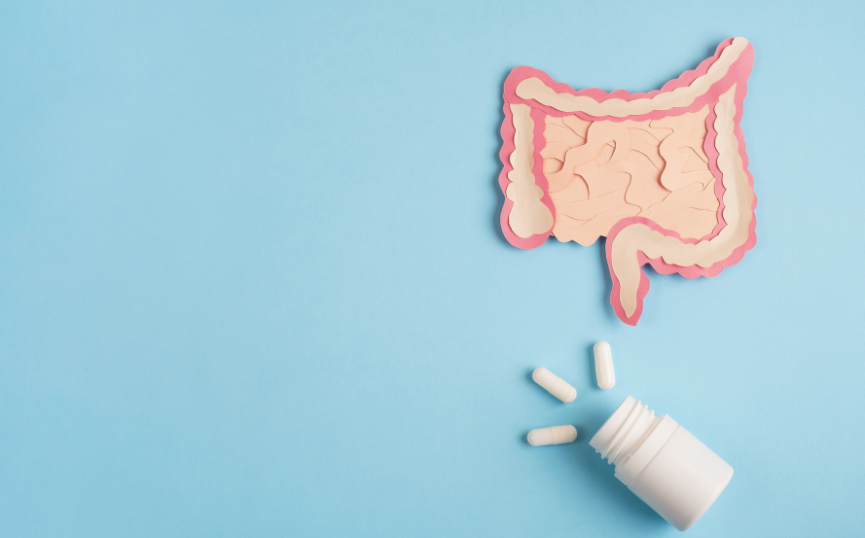Probiotics - when and which probiotic to take?
We are hearing more and more about probiotics in relation to the gut and immune system. They are the eighth most consumed nutritional supplement in the world, ahead of magnesium and vitamin A1. So there are lots of people using them, but do they know (do we?!) what probiotics really are? In this article we seek to answer this and the following questions:
- How exactly does a probiotic work?
- What makes a probiotic effective?
- When and which probiotics should you take?
- Are there probiotics specifically for children/adults?

What is a probiotic?
The human microbiome (obsolete name: gut flora) is the collection of tiny organisms (only detectable with a microscope) that live in our bodies. The gut microbiome makes up the bulk of the microbiome, and by gut we mean the entire digestive tract; that is, the section from the oesophagus to the large intestine.
Probiotic preparations are used for bacterial replenishment of the gut microbiome. In common parlance; probiotics are beneficial bacteria that live in our gut and perform many essential functions.
So first, what role do these beneficial germs play?
The gut microbiome and therefore the role of probiotics2
- To breakdown of indigestible fibres for the human body. The resulting short chain fatty acids are then used by the absorptive lining of the colon, liver and muscle. How interesting is the world? Carbohydrates that are so complex that they can no longer be digested by the human body are digested by gut bacteria instead, creating beneficial fatty acids.
- They produce B vitamins and vitamin for the host.
- They break down bile acids, sterols and xenobiotics. The breakdown of these substances mainly takes place in the liver, but gut bacteria also do their share. So a properly functioning gut microbiome also has liver protective properties.
- They have indirect immune-boosting effects15. If gut microbiome is „thriving”, that is full of beneficial germs, infections simply have nowhere to take hold. This can help to fight certain before they become rampant.
- The microbiome also indirectly affects the nervous system. More and more research is showing the link between the digestive system and the brain. 16
All in all, without the gut microbiome we could hardly exsist, which is why it is important to maintain a delicate balance of organisms that inhabit our digestive tract.
Put simply, the fewer beneficial organisms we have (not just germs, but also certain strains of viruses and fungi), the less healthy we are.

What makes microbiome worst?
- The number one enemy is antibiotics. Antibiotics are not selective! They kill the „good” bacteria as well as the infections (pathogens).
- Toxins, free radicals. Not only do these substances, which are (also) produced during our basic functioning, damage the human body, but they also have damaging effects on our gut microbiome. Regular alcohol and cigarette smoking can drastically increase the amount of toxins in your body, which can seriously damage the health of your gut flora.
- Continuous disinfection, sterilisation and avoidance of all pathogens. Our grandparents’ saying that we should eat 1 kilogram of food a year is actually based on science. As we are born, our gut is completely sterile, with no microorganisms in it, and as we came into contact with the outside world, more and more microscopic organisms (both good and bad) enter our bodies. The immune systems of animals that are raised without any living organisms at all are not functioning properly. Therefore, our immune system is in a back-and-forth relationship with the gut flora: immune cells need to recognise the good bacteria. This triggers a low level of inflammation (known as natural inflammation) in the good bacteria, which makes the immune system more effective in fighting infections. Good bacteria also produce anti-infective substances, further strengthening the immune system.
- Low-fibre diet. At the begining of this article we reported that the main food for beneficial bacteria is fibre. In other words: fibre has prebiotic (i.e. microbiome growth-stimulating) effects. Prebiotics are the fibres themselves and if we don’t eat enough of them, our beneficial bacteria starve. So instead of refined flour, use wholemeal and eat fibre-rich foods such as vegetables, fruit, oatmeal, brown rice, chia seeds and chocolate with high cocoa content.
- Lack of physical activity
- Lack of sleep
- Excessive mental stress
How do probiotics work?
The ide is that the balance can be restored by replenishing the beneficial bacteria from an external source. And as we have just read, there are factors in almost everyone’s life that can damage the microbiome. Perhaps if we moved to a desert island with our family we could eliminate most of the factors that damage gut flora, but until then we need to be careful about replenishing and nourishing it.
So gut microbiota needs to be replenished and nourished, but how much use are pre- and probiotics?
The answer is not as simple as thinking about supplementation. We’ll show you the problems that only the best supplements on the market can tackle!
1. Many bacterial strains are killed by stomach and bile acids14
To avoid this, you should choose a cellulose (a type of fibre) capsule probiotic that is indigestible to stomach acid, or a powder or solution supplement that is made with a process that makes it resistant to stomach acid.
2. Some probiotic strains can transfer antibiotic resistance to infections
This means that some beneficial strains of bacteria may express determinants that can transmit antibiotic resistance to infections in unknown ways. Explaining this would require a research paper, so note that probiotics can increase the resistance of infections to antibiotic treatments. Although there is a general public hatred of antibiotics, there are some infections where their use is not only recommended, but can be life-saving. It is generally accepted that we are exposed to, the more resistant our body becomes to them.
The antibiotic resistance transfer thesis may seem contradictory to the effects of probiotics, which is why it would be important to use a supplement that is screened for antibiotic resistant determinants.3,4 Look for the following a termékeken: „strain verified”. This means that only generally recognised as safe (GRAS) strains are included in the supplement, by testing the final product using certain procedures.
Now Foods uses the RiboPrinter® microbial characterisation system to identify strains.6 That’s why the Now Foods Probiotic range is a super choice. Now Foods’ products are also professional in the field of probiotics, among others.

What should we expect in terms of the effects of probiotics?
So, now that we’re clear: which product range is one of the best on the market! Let’s look at what can be expected from their use:
- Immune boost: if your digestive system is full of good bacteria, infections are less likely to take hold. Imagine: is an unplanted field, weeds are given the chance to reproduce, but in a field planted with a crop, they are not. 7
- Higher energy levels and better digestion: short-chain fatty acids from fibre fermentation are absorbed by the muscles, liver and intestinal wall. This allows the muscles to receive more nutrient and increase nutrient excretion and utilisation.8,9
- The liver can be relieved.17
- It can help you cope with constipation or diarrhoea.12,13
- Hormone balance: because beneficial bacteria are responsible for breaking down sterols (hormones) and producing vitamins B and K. Thus, probiotics can have overall hormone-optimising effects. They can therefore indirectly stimulate mood and brain function in general.10,11
Can probiotics be given to children?
The short answer is yes. Childhood probiotic use in clinical settings has been investigated, but the amount of studies is small. Overall, therefore, they should only be used to treat problems (i.e. long-term continued use is not recommended). Probiotics have been found by doctors to be effective for the following childhood conditions18:
- Infections gastrointestinal catarrh
- Clostridioides difficile infection, most commonly associated with diarrhoea
- Hospital-acquired diarrhoea
In children, probiotic use should be even more occasional than for adults and should wait until at least 1 year of age. Furthermore, it is best started on medical advice as an adjunctive therapy for the conditions listed above.
How and when to take probiotics?
At Vitamin360, we recommend that you use probiotic preparations intermittently, with an average of half a year off. That is, take a break of at least half a year after 1 boksz has been used up. The exception to this rule is antibiotic treatment, and after taking antibiotics, it is important to use a probiotic supplement.
However, prebiotics (fibre) should be supplemented continuously. The recommended daily fibre intake is 25- 30 grams per day5. If this cannot be maintained, then by all means use a fibre supplement, even in the long term (without skipping).
If you had to recommend only one probiotic, which would it be?
There is simply no such thing as the best. It depends significantly on one’s condition, but there is a probiotic above all! A probiotic that will generally be useful for everyone! A probiotic that survives even stomach acid fire! One that is most complex! NOW FOODS PROBIOTIC-10 100 BILLION (60 VEG CAPSULES)
And one for breathing: NOW FOODS RESPIRATORY CARE PROBIOTIC (60 VEG CAPSULES)
One for the lactose intolerant: NOW FOODS DAIRY DIGEST COMPLETE (90 VEG CAPSULES)
And one over 50: NOW FOODS CLINICAL GI PROBIOTIC (60 VEG CAPSULES)
Finally, ones that’s both pre- and probiotic: NOW FOODS GR8-DOPHILUS™ (120 VEG CAPSULES)
There is simply no way to decide, so choose the right probiotic for your condition!
Used sources:
- https://www.statista.com/statistics/1262692/vitamins-minerals-and-supplements-consumed-globally/
- (1997) „Role of intestinal bacteria in nutrient metabolism”. Clinical Nutrition 16, 3–9. o. DOI:10.1016/S0261-5614(97)80252-X. PMID 16844615.
- https://zenodo.org/records/10534041
- https://efsa.onlinelibrary.wiley.com/doi/pdf/10.2903/j.efsa.2008.923
- https://www.ucsfhealth.org/education/increasing-fiber-intake
- https://www.nowfoods.com/quality-safety/verified-probiotic-identity-and-potency
- Yan F, Polk DB. Probiotics and immune health. Curr Opin Gastroenterol. 2011 Oct;27(6):496-501. doi: 10.1097/MOG.0b013e32834baa4d. PMID: 21897224; PMCID: PMC4006993.
- Díaz-Jiménez J, Sánchez-Sánchez E, Ordoñez FJ, Rosety I, Díaz AJ, Rosety-Rodriguez M, Rosety MÁ, Brenes F. Impact of Probiotics on the Performance of Endurance Athletes: A Systematic Review. Int J Environ Res Public Health. 2021 Nov 4;18(21):11576. doi: 10.3390/ijerph182111576. PMID: 34770090; PMCID: PMC8583504.
- Hemarajata P, Versalovic J. Effects of probiotics on gut microbiota: mechanisms of intestinal immunomodulation and neuromodulation. Therap Adv Gastroenterol. 2013 Jan;6(1):39-51. doi: 10.1177/1756283X12459294. PMID: 23320049; PMCID: PMC3539293.
- Szydłowska I, Marciniak A, Brodowska A, Loj B, Ciećwież S, Skonieczna-Żydecka K, Palma J, Łoniewski I, Stachowska E. Effects of probiotics supplementation on the hormone and body mass index in perimenopausal and postmenopausal women using the standardized diet. A 5-week double-blind, placebo-controlled, and randomized clinical study. Eur Rev Med Pharmacol Sci. 2021 May;25(10):3859-3867. doi: 10.26355/eurrev_202105_25953. PMID: 34109594.
- Kim CS, Cha L, Sim M, Jung S, Chun WY, Baik HW, Shin DM. Probiotic Supplementation Improves Cognitive Function and Mood with Changes in Gut Microbiota in Community-Dwelling Older Adults: A Randomized, Double-Blind, Placebo-Controlled, Multicenter Trial. J Gerontol A Biol Sci Med Sci. 2021 Jan 1;76(1):32-40. doi: 10.1093/gerona/glaa090. PMID: 32300799; PMCID: PMC7861012.
- Mitelmão FCR, Häckel K, Bergamaschi CC, Gerenutti M, Silva MT, Balcão VM, Vila MMDC. The effect of probiotics on functional constipation in adults: A randomized, double-blind controlled trial. Medicine (Baltimore). 2022 Oct 28;101(43):e31185. doi: 10.1097/MD.0000000000031185. PMID: 36316826; PMCID: PMC9622669.
- Huang R, Xing HY, Liu HJ, Chen ZF, Tang BB. Efficacy of probiotics in the treatment of acute diarrhea in children: a systematic review and meta-analysis of clinical trials. Transl Pediatr. 2021 Dec;10(12):3248-3260. doi: 10.21037/tp-21-511. PMID: 35070839; PMCID: PMC8753473.
- Wang Y, Jiang Y, Deng Y, Yi C, Wang Y, Ding M, Liu J, Jin X, Shen L, He Y, Wu X, Chen X, Sun C, Zheng M, Zhang R, Ye H, An H, Wong A. Probiotic Supplements: Hope or Hype? Front Microbiol. 2020 Feb 28;11:160. doi: 10.3389/fmicb.2020.00160. PMID: 32184760; PMCID: PMC7058552.
- Wiertsema SP, van Bergenhenegouwen J, Garssen J, Knippels LMJ. The Interplay between the Gut Microbiome and the Immune System in the Context of Infectious Diseases throughout Life and the Role of Nutrition in Optimizing Treatment Strategies. Nutrients. 2021 Mar 9;13(3):886. doi: 10.3390/nu13030886. PMID: 33803407; PMCID: PMC8001875.
- Appleton J. The Gut-Brain Axis: Influence of Microbiota on Mood and Mental Health. Integr Med (Encinitas). 2018 Aug;17(4):28-32. PMID: 31043907; PMCID: PMC6469458.
- Eslamparast T, Eghtesad S, Hekmatdoost A, Poustchi H. Probiotics and Nonalcoholic Fatty liver Disease. Middle East J Dig Dis. 2013 Jul;5(3):129-36. PMID: 24829682; PMCID: PMC3990183.
- Depoorter L, Vandenplas Y. Probiotics in Pediatrics. A Review and Practical Guide. Nutrients. 2021 Jun 24;13(7):2176. doi: 10.3390/nu13072176. PMID: 34202742; PMCID: PMC8308463.





